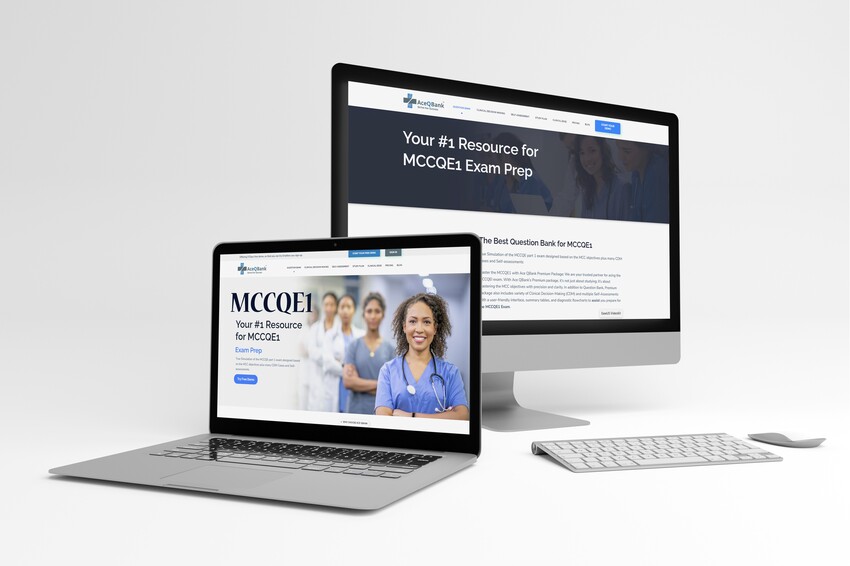Ultimate Key to Passing PLAB and MCCQE1 Exam

In your journey as a devoted medical professional, overcoming critical examinations stands at the heart of career progression. Essential milestones such as the Professional and Linguistic Assessments Board (PLAB) and Medical Council of Canada Qualifying Examination (MCCQE) Part 1, act as trusted gateways for those dreamers who aspire to bring about healing within the UK and Canada respectively.
These exams hold immense significance as they serve as gateways to career advancement and open doors to practice opportunities in these highly sought-after regions. With the growing demand for a reliable question bank to prepare for these exams, Ace QBank emerges as the leading choice for aspiring medical professionals to achieve success in both PLAB and MCCQE1.
The qbank has long been hailed as the ultimate question bank for MCCQE1 preparation, but today we unveil its hidden potential in conquering the PLAB examination, paving the way for limitless possibilities. In this blog, we will delve into why the qbank is recognized as the best for MCCQE1 and explore its suitability for PLAB as well. We will also highlight the key features that set the qbank apart from other resources.
Overview of the PLAB and MCCQE1 Exam
In Canada and the United Kingdom the medical sector is highly regulated. Only individuals who pass the qualification tests are allowed to pursue training after graduation.
This strict process is, in place to uphold a level of excellence in healthcare services. It guarantees that all residents have access to top notch treatment. Irrespective of their social or economic background.
Lets delve deeper into these exams; the PLAB and MCCQE Part 1. These exams play a role for aspiring doctors aiming to practice in the UK and Canada
The PLAB exam evaluates the understanding, expertise and practical skills of candidates. It verifies their compliance, with the standards set by the General Medical Council (GMC). Passing allows International Medical Graduates (IMGs) to apply for a license, in the United Kingdom. Also gives them an edge in securing desirable job opportunities.
Likewise, passing the MCCQE1 exam is essential for healthcare professionals who want to practice medicine in Canada. This exam evaluates candidates fundamental knowledge and clinical proficiencies required for effective practice, within Canadas healthcare system. Successful candidates showcase their ability to provide top tier patient care and contribute positively to healthcare services.
However, to excel in the PLAB and MCCQE1 exams. Comprehensive preparation is essential. Candidates must dedicate ample time and effort to study and review the required medical knowledge. They need to familiarize themselves with the exam formats, content, and scoring systems to effectively tailor their study plans and strategies.
Since these exams are timed and computer-based. Candidates must develop effective test-taking skills, including time management, critical thinking, and decision-making. This is to perform well under the pressure of these rigorous exams. It is crucial to emphasize here that a lack of proper time management is a common cause of failure in these examinations.
With the significance of these qualification exams in mind. It is crucial for aspiring medical graduates to approach their preparation with dedication and focus. This is a reason why a majority of candidates invest in comprehensive exam resources. Not to just maximize their chances of success but also to position themselves for a rewarding medical career in the UK or Canada.
Note
I understand you may have several questions regarding these qualification exams. With the USMLE steps becoming less ideal, many are on the hunt for a superior alternative. This article might not provide answers to the questions mentioned below:
- What IELTS score is required for PLAB?
- How to book PLAB 1 quickly?
- What are the eligibility criteria for PLAB?
- Is PLAB accepted in Canada?

Ultimate MCCQE1 Vs PLAB
The differences between the two exams for medical graduates from other countries, Canada, and the UK are very interesting to many people. However, it’s really important to understand that doing well in these tests requires a lot of hard work, true dedication, and full preparation. Therefore, candidates who want to pass these exams need to learn a lot about what each test expects and asks for.
Canada has made its qualification process faster and more flexible. This is good for medical graduates who want to move to Canada for work because they can now get their necessary qualifications easier and quicker. The government did this to encourage skilled workers from all over the world to come to Canada.
Note:
During the pandemic the administration of MCCQE Part 2 was discontinued. Prior to this development, the MCCQEE was discontinued. The current Canadian medical qualification process now comprises solely of MCCQE Part 1 and the NAC examination. This streamlined process has transformed Canada into an attractive destination for IMGs.
Moreover, the Canadian government has rolled out new programs. Such as the Express Entry system, which prioritizes applicants with sought-after skills and experience.
While this is an interesting topic. It’s not directly related to our current discussion on qualification exams. If you’re keen to learn more about the Practice Ready Assessment Program. Feel free to check out our latest blog post in the Opportunities for IMG section. Let’s get back to qualification exams.
The journey to conquering these exams is fraught with challenges, notably in managing time efficiently. Candidates must not only master the vast material but also learn to navigate the pressure of performing under strict time constraints. It’s a test of endurance as much as it is of medical knowledge.
To rise above these obstacles, candidates are encouraged to adopt strategic approaches to their study. Resources like Ace QBank stand out for their role in honing clinical judgment and improving diagnostic reasoning through clinically relevant questions. Knowing the exam format and using smart test strategies greatly increases success chances.
Yes, It is a demanding journey, but one that rewards diligence and dedication with the privilege of advancing in the noble field of medicine.

What Are the Similarities Between MCCQE1 And PLAB?
It is fascinating to discover that despite their apparent differences. The two exams have more similarities than differences. This realization highlights the importance of looking beyond surface-level distinctions and seeking out commonalities. Recognizing similarities can help you choose better resources in your preparation. The resource that can make the daunting task of studying for the qualification exam a breeze.
Let’s talk honestly about the “evaluation system“. The evaluation system presents a significant component to any medical licensing exam, inclusive of MCCQE1 and PLAB exams which utilize closely aligned systems.
The principal aim of these evaluation structures is to genuinely gauge the proficiency levels of physicians irrespective of their origin – domestic or international – this embodies an essential role in maintaining standards within our healthcare provision.
The evaluation process encompasses not only testing crucial aspects like medical knowledge but also spans through clinical skills, consequential decision-making abilities and most importantly upholding professional behaviour.
This exhaustive approach is designed with utmost care so as to confirm that our doctors are not merely well-informed individuals but carry necessary patient-handling skills along with strong ethical values that act as an underpinning factor for delivering exceptional patient care services.
The most striking similarity is “the main objective” — the purpose and standard they both strive for. The main objective of medical qualification exams is to verify that a candidate possesses the ability to practice medicine.
This includes understanding disease processes and their management. Interpreting medical data accurately and making appropriate clinical decisions. They serve as a credible measure of a practitioner’s ability to provide safe, effective, and ethical medical care.
The aim is to ensure that those who pass the exam. Are knowledgeable, safe, ethical, and can deliver high-quality care independently. That they are fully capable of assuming the significant responsibility that comes with the title of ‘Doctor’, which includes owning the trust that patients place in their healthcare providers.
One of the key similarities between them is the use of the same “laboratory unit” for both exams. This similarity is based on the International System of Units (SI), which is a standardized metric system used in both exams. This uniformity in units of measurement means that preparation materials for one exam can often also be useful for the other.
For example, the Ace QBank, a Canadian question bank designed for MCCQE1 preparation, can also be used as an effective study aid for PLAB.
Now the similarity is that I know you all are waiting for ” the Scope of the exam.” Both encompass an extensive array of medical disciplines. The areas of focus encompass Internal Medicine, Surgery, and Pediatrics.
Moreover, there is also a concentration in both Obstetrics/Gynecology and Psychiatry supplemented by an orientation toward Public Health.
However, the main point is that questions from these disciplines are created based on the objectives list set by the Medical Council of Canada. The very same objectives list is in accordance with Canadian Medical Education Directives for Specialists (CanMEDS).
Level up your exam success with Ace Qbank!
Elevate your exam performance to new heights, and experience unparalleled quality for free with our demo account today!
Some of you may already know the fact that PLAB 1 questions are designed based on the same objectives list as MCCQE1. The objectives outlined by the General Medical Council (GMC) in the UK, are also reflected in the Medical MCC objectives. After all, these objectives cover similar grounds, focusing on ensuring that candidates possess the necessary medical knowledge, clinical skills, and professional attitudes to practice medicine effectively and ethically.
On the other hand, the CanMEDS framework is a different story. The point worth mentioning here is that the GMC does not directly adopt it in the UK. However, the principles and competencies outlined in CanMEDS are echoed in the GMC’s own frameworks and guidance for medical education and practice.
The GMC sets standards through documents like “Good Medical Practice” and “Outcomes for Graduates,” which share similarities with the CanMEDS roles, emphasizing patient care, professionalism, communication, and teamwork. Thus, while not formally accepted as the framework in the UK, the essence of CanMEDS is aligned with the GMC’s expectations for medical professionals.
If you look at “Good Medical Practice,” for instance, very closely. You see, it is intended to foster workplaces that are courteous, fair, and empathetic to colleagues and patients. Its objectives are to combat prejudice, promote equitable and inclusive leadership, and advance patient-centred care. The CanMEDS framework is based on the same fundamental principles.
The other similarity is “Evaluation of Communication Skills.” Both examinations strongly emphasize evaluating candidates’ communication skills. This is particularly important in medicine, where effective communication can significantly impact patient care.
In both of these examinations, candidates are assessed based on their interactions with virtual patients, which refer to the questions and clinical case scenarios presented in the exams. These scenarios aim to simulate real-life clinical situations where a candidate’s communication skills can be put to the test.
However, communication with other healthcare professionals is also a critical component of these exams. Candidates must effectively collaborate and share information with the healthcare team to ensure care continuity and quality. This concept is the origin of that long, tricky, and time-consuming psychiatry and some ethics questions.
The best part is Ace QBank shines in this part and has your back. You will encounter high-yield questions that challenge you.
Qualification Exam Similarities | ||
Features | MCCQE1 | PLAB |
Evaluation System | Designed to assess clinical knowledge and decision-making | Designed to assess clinical knowledge and decision-making |
Objectives | Based on MCC Objectives | Based on GMC Objectives |
Scope | Covers 21 categories | Covers 21 categories |
Communication Skills | Assess in medical settings | Assess in medical settings |
Professionalism | CanMEDS | Good Medical Practice |
International Applicants | IMGs favorite | IMGs favorite |
Another similarity is “Professionalism.” Professionalism is a vital component of medical practice and is, therefore, a key area assessed in both. This shared emphasis on professionalism is a significant similarity between these two exams.
The whole point is to check how well a candidate knows and uses medical ethics. This includes their skill in making ethical decisions in tricky situations, treating patients with respect and dignity, and knowing the ethical rules of their job.
One such standard is confidentiality. Candidates need to demonstrate their understanding of patient privacy rights and how to maintain confidentiality in various medical situations. This is critical in building trust between the doctor and patient and is central to ethical medical practice.
The other is a doctor’s professional responsibilities. These include accountability, commitment to patient safety, appropriate resource management, advocacy, and maintaining professional boundaries.
At this moment, you may ask, “Can they ensure these competencies in NAC or PLAB2?” The answer is yes, but they want to be through. This is why these qualification exams are acceptable in many countries.
Essentially, both tests emphasize that to be a skilled doctor, it’s not enough to have medical expertise. One must also demonstrate ethical and professional conduct. Also want to make sure candidates are more than just clinical competence.
Last but not least, “International Applicants.” One notable similarity between the two is both are open to international applicants. Both exams offer opportunities for international medical graduates to qualify to practice medicine in their respective countries, Canada and the United Kingdom.
International medical graduates who have completed their medical education from any medical school outside of Canada can apply to take the MCCQE1, whereas the PLAB test is designed for international medical graduates who wish to practice medicine in the UK.
This allows for diverse and globally-trained medical professionals to bring their knowledge, skills, and perspectives to Canada or the UK’s healthcare systems. The exams partially serve as a way to ensure that all practicing doctors. Regardless of where they received their medical degree, meet the stringent medical and ethical standards required in these countries.
Both exams aim to assess whether the candidates’ medical knowledge and skills, their awareness of the ethical and culturally responsive approach to healthcare, align with the expectations and practices in Canada and the United Kingdom.
Therefore, regardless of their medical training background, all doctors must prove they have the necessary competencies to practice medicine independently and safely within these specific healthcare systems.
Despite the similarities, the structure of the tests, scoring methods, and the process of applying for these exams might be very different. Let’s explore these differences in the next section.

What Are the Differences Between MCCQE1 And PLAB?
The MCCQE Part 1 and PLAB exams assess international medical graduates seeking licensure. Despite a few distinctions, both exams have numerous similarities in their structure and objectives.
The main differences are related to their format, eligibility criteria, and cost. Despite these differences, both exams serve the same purpose. Let’s delve a bit deeper into each aspect to understand the distinctions of these exams fully.
Exam Format
When talking about exams. Especially those that lead to big milestones in our careers like the PLAB and the MCCQE1. The format of these exams becomes pretty important. It’s not just about what they ask. But also how they ask it. How long you’ve got to answer, and what they’re expecting from you overall.
Let’s take a closer look at the PLAB exam. Which has two parts. The first part, PLAB 1, is a computer-based test. Imagine sitting down and answering all about being a doctor. From treating sick kids and helping expectant mothers to manage emergencies and performing surgery. You’ve got three hours to work through 180 questions that really get into not just what you know. But how you’d use that knowledge when it matters most.
Then there’s PLAB 2, which is all about showing rather than telling. It’s a hands-on test where you’re moving from station to station, almost like an actor moving between sets. But each set is a different medical scenario. Here, it’s your chance to shine by showing how you’d interact with patients and work with other healthcare professionals, all while being in the thick of diagnosing and managing patient care.
MCCQE1 vs PLAB | ||
Exam | Format | Structure |
PLAB 1 | Computer-based | 180 multiple-choice questions |
MCCQE Part 1 | Computer-based | 210 multiple-choice questions |
38 CDM cases | ||
Shifting gears to the MCCQE1 exam, this one’s also about proving your medical mettle but throws in a unique twist with its clinical decision-making section. The first half of the day is packed with 210 MCQs that cover the breadth of medicine. Then, after what I imagine is a much-needed lunch break. You dive into the afternoon session.
This part gets real. This will present you with 38 clinical scenarios that are about as close as you can get to the real thing without actually being in a hospital or clinic. Each scenario asks you to make decisions that could impact virtual patients’ lives, testing not just what you know. But how you think and act in those critical moments.
These exams aim not only to assess your understanding but also to evaluate your ability to apply this knowledge in practical scenarios. It is about making sure that when the time comes. You are not just a good test-taker, but a great doctor.
Eligibility
Candidates are required to adhere to specific eligibility criteria laid down by their governing bodies for participating in either MCCQE1 or PLAB examinations.
For candidacy towards the MCCQE1, individuals must either be citizens of Canada or possess a Permanent Residency (PR) card. Additionally, they should have graduated with their medical degree from an accredited institution located outside of Canada.
As for qualification for the PLAB examination, it necessitates that candidates possess an acceptable primary medical qualification as recognized by GMC. Should English not be their first language, proof of proficiency in this language must also be provided through IELTS or OET examinations. Notably, there aren’t distinctive citizenship or residency prerequisites outlined for appearing in the PLAB examination.
Cost
For MCCQE1 fee is CAD 1,420. This fee covers both parts of the exam. Registration for MCCQE1 can be done online through the MCC website during specific registration periods.
In contrast, PLAB has separate fees for each part of the exam. Part 1 costs £250-270 while Part 2 costs £934- 981. Candidates must register separately for each part through GMC’s online portal during specified registration periods.
I’ve discussed the PLAB 2 exam, so it’s only right to also talk about the current cost of the NAC exam. For NAC, the examination fee is CAD $ 3,145.

Passing with Ace QBank Your PLAB Exam
Navigating the path to becoming a practising doctor in the UK is admirable yet challenging. The PLAB test is an essential milestone for IMGs.
Given the pivotal role of this exam, choosing the right preparatory resources is crucial. Among the myriad options available, Ace QBank stands out as a beacon for PLAB candidates, offering unparalleled tools and resources designed to streamline the preparation process.
So, what makes the Ace QBank to be your ultimate ally? At its heart, it’s the commitment to high-yield questions. Each is meticulously crafted to align with the objectives set by the Medical Council of Canada.
This means every moment you spend delving into this qbank is not just preparation but a strategic step towards mastering the essential knowledge for the exam. The question bank doesn’t just prepare you; it primes you for success, focusing on what truly matters.
What Are the Unique Features of the MCCQE1 QBank?
Stepping into the arena to face the MCCQE Part 1 is a defining moment in medical career, and choosing the right study companion can greatly impact route to success. This is where it stands out, establishing itself not merely as any question bank, but as a guiding light leading you towards excellence in your exams—right here in Canada.
But the qbank offers more than just questions. It’s designed with a single purpose. Ease your preparation journey and ensure your victory. Its detailed explanations and up-to-date content make it an unmatched tool in your exam prep arsenal. Choosing the Ace QBank means selecting a partner who is deeply committed to your success.
Let’s explore all the features of the question bank:
Extensive Question Database
At the heart of the qbank’s unparalleled efficacy is its extensive database of practice questions. This isn’t just an ordinary set of questions. It’s a meticulously chosen assortment that reflects the real MCCQE1 and PLAB exams in terms of format, difficulty, and style. With a treasure trove of thousands of practice questions available, you have a fantastic opportunity to rigorously assess and hone your knowledge across all the essential areas.
The scope and depth of the question bank ensure that every facet of your preparation journey is addressed. You’ll have the chance to pinpoint your areas for improvement and make sure you’re thoroughly ready when the big day comes.
For those considering the question bank, a demo account provides a glimpse into the functionality and quality of questions available. Every question in the demo account is handpicked to showcase not just the functionality of the question bank but also its commitment to quality and relevance.
However, within this demo, you’ll notice the inclusion of 21 categories—showcasing the wide range of topics covered. Though access to the full suite of questions requires an upgrade, this sneak peek is enough to demonstrate the thoughtfulness and attention to detail that goes into each question.
Benefits of using Ace QBank for MCCQE1 | |
Extensive question bank | Our updated version contains over 130 new high-yield questions, ensuring thorough coverage of the MCCQE1 objectives. |
Targeted learning | The questions are specially crafted to evaluate your understanding of key objectives and concepts, helping you pinpoint areas where you can enhance your knowledge. |
Realistic exam simulation | The question bank offers a practical exam simulation, allowing you to get used to the question formats and time limits that you will encounter during the real exam. |
Detailed explanations | Every question comes with detailed explanations to ensure that you grasp not just the right answer but also the fundamental concepts. |
Performance tracking | The platform enables you to monitor your progress. Pinpoint your areas of strength and weakness to adjust your study schedule accordingly. |
Flexibility and convenience | It provides convenient access for studying at your own pace and convenience, from any location. It also includes two study modes to assist in exam preparation. |
Utilizing Ace QBank for MCCQE1 will certainly enhance your confidence and increase your likelihood of success in the examination. | |
High-Yield Questions
The question bank features a remarkable set of more than 2700 high-quality questions. These questions are carefully curated to reflect the standards of the Medical Council of Canada, ensuring that you’re not only ready but deeply knowledgeable in the material, all while being challenged at the MCCQE1 level.
What sets this qbank apart is its dynamic nature; it grows and adapts, continuously incorporating recent updates, new objectives, and the latest information. This ensures that every question remains highly relevant and directly aligned with what you’ll face on exam day. The program doesn’t only educate you; it also adapts alongside you, ensuring that you consistently maintain an advantage in your studies.
For those who are intrest in knowing more about these updates. You can check out the details of our latest update in February. We just added more than 100 high-yield questions to the question pool.
Detailed Explanations
The real magic of the question bank isn’t just the quantity of questions it brings to the table. But the exceptional clarity and depth of the explanations that go with them. Each question doesn’t just tell you which answer is right. It takes you on a journey through the reasoning behind the correct choice. While also gently pointing out why other options don’t quite make the cut. This thoughtful approach does more than just confirm your grasp of key concepts. It also helps you spot and bridge any gaps in your understanding.
And there’s something even better—the guidance you get is deeply rooted in evidence-based medicine. This means every bit of information handed to you isn’t just accurate; it’s also directly relevant to your clinical practice.
Coupled with regular updates, these explanations make the Ace QBank the most dependable tool in your arsenal for exam preparation.
Performance Analytics
Imagine having a personal guide that charts your progress and shines a light on the road ahead, pinpointing exactly where you excel and where you could use a bit more polish. These aren’t just numbers—they’re your personalized map to mastery.
With Ace QBank, every question you tackle brings you one step closer to your dreams, guided by clarity and insight. Let’s turn your hard work into smart work, focusing your efforts with precision for the most effective study experience.

Visual Aids
You Can dive into the complexities of medical knowledge with ease. Thanks to the qbank’s comprehensive visual aids. Through a series of summary charts and flowcharts, even the most complex medical concepts are distilled into clear, manageable insights. But we don’t stop there – our custom illustrations are designed not just to accompany your study but to transform it.
These visuals are crafted to enhance recall, ensuring that critical information is not just understood but remembered.
Study Modes
We understand that mastery comes in different forms and through various methods. That’s why we offer two distinct study modes: Time and Tutor. The Time Mode is perfect for disciplines you’re already comfortable with, allowing you to challenge yourself further by honing your time-management skills under exam-like conditions.
On the other hand, the Tutor Mode is your ally in conquering the more challenging disciplines. It’s designed to deepen your understanding and ensure you grasp the objectives related to these tougher topics. Whether you’re looking to speed up or slow down, the question bank’s study modes adapt to your needs, ensuring that every study session is as efficient and effective as possible.

Why Choose Ace QBank for PLAB Exam Preparation?
The qbank stands out in the PLAB exam preparation landscape, not only for its comprehensive content but also for its user-centric learning experience. What sets it apart is its commitment to the relevance and accuracy of its questions, ensuring that every item is both exam-relevant and meticulously verified. This dedication to quality underlines the qbank’s reliability.
Moreover, it excels by thoroughly covering the exam’s objectives. Understanding that mastering them requires more than memorizing facts—it’s about connecting them coherently. The platform ensures a comprehensive preparation journey.
Retention is key to the question bank approach. Recognizing the importance of not just understanding but retaining and recalling information under exam conditions, it employs strategies like repetition, application-based learning, and feedback to enhance memory retention and overall performance.
Let’s now highlight the standout features of this exceptional question bank and why should you choose Ace QBank for PLAB:
- Coverage and Relevance
- Content Update
- The Innovative Twist
- Self-Assessments
Coverage and Relevance
In the high-stakes board exams, where every detail counts, our editorial team works tirelessly to ensure that our question database is not just a study tool, but a strategic ally in your exam preparation. By meticulously aligning the content with the latest objectives of the MCCQE Part 1 exam and adhering to current medical guidelines, we guarantee relevance and comprehensive coverage. This unwavering commitment to up-to-date and exhaustive material significantly boosts your chances of acing the exam.
The similarities between the MCCQE1 and PLAB 1 exams present a golden opportunity for candidates preparing for the PLAB. The question bank, with its focused approach to coverage and relevance, has become an indispensable resource for PLAB preparation as well. Embrace this chance to prepare with the most relevant and comprehensive material available, setting yourself up for success in your medical career.

The Innovative Twist
Recognizing that mistakes are not just setbacks but opportunities for growth. We have developed the capability to create customized question blocks from your incorrect answers. This innovative approach gives you a second chance with the toughest questions, ensuring that no challenge is left unmastered.
This distinctive characteristic aims to enhance your comprehension of important ideas and consolidate your knowledge in areas where improvement is necessary. By confronting difficult questions directly and transforming your weaknesses into strengths, you are not only getting ready for an exam. You are cultivating a mindset of resilience and continuous improvement.
Content Update
In the fast-paced world of medicine. It is crucial to stay current as new knowledge and practices continue to evolve. It is not just something you should do. It’s something you need to do to provide the best care for patients.
We embody this principle by ensuring our content is regularly updated and expanded. The updates go beyond merely adding new questions. We delve deep into enhancing explanations, refining question stem, and enriching our educational tools with detailed flowcharts and summary tables.
We believe in the power of community, and user feedback plays a pivotal role in guiding our updates. Our interactive feedback system allows users to directly influence the improvement process directly. Ensuring that our question bank not only meets but exceeds your preparation needs.

Self-Assessments
When studying for the board exam. It’s crucial to know exactly where you stand. That’s where Ace QBank steps in, offering two detailed self-assessments designed to mimic the real exam atmosphere and question structure.
The self-assessments are unique. Each features 120 carefully chosen questions distinct from the main question bank. This ensures you face new challenges, accurately gauges your readiness, and highlights areas for improvement.
These assessments are more than just tests. They’re a realistic simulation of exam conditions, giving you a clear insight into your preparation levels. This not only helps identify where further study is needed but also boosts your confidence by acquainting you with the exam format.
Assessments are valuable opportunities to transform weaknesses into strengths before the exam. They serve as essential checkpoints in your preparation, enabling effective study time allocation and focus on crucial topics.

Key Takeaways
The PLAB and the MCCQE1 exams have become pivotal in post-graduation training, increasingly favoured by International Medical Graduates as gateways to opportunities, offering job stability, cultural respect, and citizenship paths. Moving beyond the diminishing appeal of the United States Medical Licensing Examination (USMLE), these exams provide a multifaceted package that aligns with the aspirations of those seeking a notable medical career. Their growing popularity underscores a shift towards a more comprehensive and rewarding medical education and career advancement trajectory.
The MCCQE1 and the PLAB might seem different at first glance, but they share more in common than you’d think. The questions in both exams are carefully crafted, aligned with the objectives shared by the MCC and GMC, ensuring a thorough evaluation of medical knowledge and skills. This alignment doesn’t just underline the global standards of medical proficiency but also makes it easier for medical professionals to gain qualifications across these regions.
For PLAB 1 exam preparation, Ace QBank stands out as the premier alternative. Its questions are based on the MCC objectives. Providing in-depth explanations to prompt a thorough understanding of the essential information. High yield questions also associate with summary points that help with practicing pattern recognition, understanding key points and clinical reasoning.
On the other hand, hundreds of visual aids, it simplifies complex topics, enhancing understanding and memory retention. The qbank not only makes residency in Canada in the first attempt possible but also is the optimal choice for top-tier PLAB 1 preparation. It makes every effort to help you succeed and achieve a high score.


